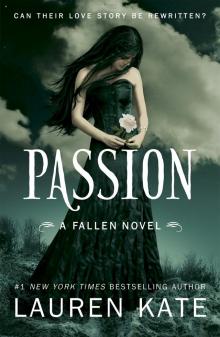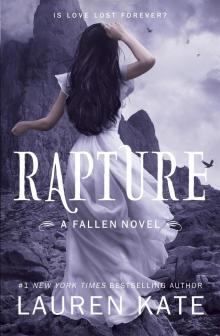- Home
- Lauren Kate
The Orphan's Song Page 3
The Orphan's Song Read online
Page 3
The sound ripped through the cathedral. Everyone froze mid-note and turned to stare. The prioress glowered, and with a single pointed finger, evicted Violetta.
“To confession.”
* * *
VIOLETTA DIDN’T GO to confession. When she fled the gallery, then the anteroom, when she crossed the bridge back to the dormitory and imagined cloistering herself in Father Marché’s chambers, Violetta could not breathe. She had to calm herself, and there was only one place at the Incurables to do that.
She went to the attic, but today when she got to the window, she felt trapped by the glass, oppressed by the view—all those boats on the water, all those people so much freer. She needed a greater escape.
She pressed her hands to the windowpane. When it gave a little, her fingers moved to the edge of the glass near the casement and she jiggled the pane. It came loose and she slid it out in amazement, leaning the glass against the wall beneath the window.
Brisk autumn air rushed in, inviting her outside. Did she dare?
Later, she could bear the confession booth. Later, she could add what she was about to do to her litany of sins. She moved a crate closer, stood atop it. She hoisted one foot, then another, to the sill, until she crouched upon its threshold.
She held the casement for balance as she straightened to stand on the window’s exterior ledge. Her heart raced as she brought her chest level with the roof. She wiped dampness from her palms, reached up, and wrapped her fingers around the low parapet. She could see beyond it to the dominating white dome of the Santa Maria della Salute at the eastern tip of Dorsoduro. And then, she could see the horizon, that magical beyond where the magnitude of Venice condensed into a single brilliant line. Violetta wished to walk along it, the way she’d once seen an acrobat walk a cable stretched to a height of ten men, from one end of Campo Santa Margherita to the other.
She raised her right leg until her foot notched over the roof’s ledge. Then she made the mistake of looking down. The sight of the drop paralyzed her. For several moments, she could not move.
But then she glimpsed the wheel, barely visible, four stories down. And she thought of that mother abandoning that boy all those years ago. The time had come to leave that night behind. Maybe she would always dream that song, but wasn’t it hers by now? Why couldn’t she ascend beyond what she’d seen happen at the wheel?
The wind spurred her on. She sang to it as she pulled her body higher.
I am yours, you are mine.
One more turn and I’m the sky.
When finally she reached the roof’s flat top, she collapsed on her back, gazing at a sky so blue it hurt to look at. She wanted to laugh at her achievement, but the need to weep won out.
Curse her impulsiveness, her bony shoulder and tattooed heel. Had it cost her the coro? Could she stay up here forever?
She rose and looked around. The day was windy and bright. Sunlight sparkled on the canal and made the boats look like black gems. Down on the Zaterre, white awnings sheltered people flirting on café steps. Across the water, the island of Giudecca beckoned with its row of tall palazzi facing the promenade, each of them roofed in warm orange terra-cotta. Spires of cypress tress protruded above iron garden gates.
It was only mid-September, but the air was turning crisp. There was smoke on the wind, and rosemary and verbena from the pots in apartment windows. Underneath, always, was the salty musk of the canals.
Music filtered through the air. It was everywhere if you had the luxury to listen. For the first time, Violetta felt free to take in her city’s wondrous, accidental melodies. The slap of oars against the water, the bright banter of hawkers selling watermelon on the Zattere. Here came the staccato whip of windblown bedsheets on a line. She closed her eyes and heard all of it doubled, the way everything in Venice was reflected a second time on the water, as if God had noted in the composition of the city that it was to be played forte, extra strong.
Brassy tones of laughter broke through and made Violetta crouch at the parapet. She glanced west, toward the next building, whose roof stood one level down. Her hiding spot was bare of any comfort, but the neighboring roof was a sumptuous altana—a welcoming open-air balcony made somewhat private by Arab lattices and trailing verbena. Leather awnings shaded seats for a dozen. A bronze sundial stood on a marble pedestal in the corner. A wicker table brimmed with pomades and potions, trays of grapes and apricots, crystal platters stacked with tarts.
Four women lazed on the altana, bleaching their hair in the sun. Their heads were covered with special wide-brimmed caps that shaded their faces but exposed their hair to the light. Violetta guessed the ladies had only a handful of years on her, but their laughter made her feel like a child. It was rich with womanly knowledge, brushed lightly with hedonism.
Had she ever heard an Incurables girl laugh with that much spirit? Not even Giustina, who could access four octaves without wheezing.
Violetta was dazzled by the elaborate rituals of their toilette. One woman, whose face was slathered with a pale blue cream, lifted lace fans from a basket, settling on a rich purple one to bat the autumn air. Another, whose hair was set in rolls above her cap, painted her nails with silver lacquer, sipping from a small crystal teacup between coats. A third rose from her chair to check the progress of the fourth woman’s coiled tresses, a stack of bracelets jangling on her wrist.
“Don’t touch,” a man’s voice warned. “She’s still drying.”
Now Violetta noticed the two men hovering in the shadows. They wore the powdered periwigs so fashionable among the upper class. Their pastel britches matched their silken blouses and the ribbons tied around their stockings. Violetta gaped at them, transfixed. These were cicisbei, a strange breed of cavalier servants particular to Venice’s patrician class.
She had heard the zie whisper about a man who had taken a cicisbeo position with a wealthy noble couple. He earned seventy sequins a year for his service, more than enough for a bachelor.
But what exactly did he do? another zia wanted to know—and so had Violetta, leaning close with Laura to eavesdrop. The first zia explained that while the senator was occupied, the cicisbeo looked after his wife in any manner she desired.
The zie had laughed and Violetta had blushed without knowing exactly why. And then, on the Christmas alms walk, a combination of high tide and heavy rain had flooded the streets—and Violetta had stopped in the middle of the orphans’ chant to watch a cicisbeo hoist a lady in his arms to cross a deluged calle.
She had understood from the woman’s eyes and the cicisbeo’s hands that there was more at play than a lady’s wish to keep her skirt dry. For the first time, she had seen desire’s spark. She’d felt a warmth coursing through her belly that made her wish she were in that man’s arms, if only to feel what it was like to be wanted in that way.
She couldn’t begin to imagine what a lover might be like. Incurables girls wore the expectation of eternal virginity like a second cloak. It was part of what distinguished them from any other Venetian woman who performed onstage. Singers at operas or masquerades were considered immoral by nature of their performance; but the coro girls were different, singing in the image of the vestal virgins of Rome.
Well, there was one chance at sex. Occasionally, a man would ask the prioress for a meeting with a coro girl he’d heard at mass with the goal of taking home a bride. These meetings were a source of fascination for the younger girls, not only because they involved a man from outside the orphanage, but because, if a coro girl determined to marry, she left a space for one of the younger students to move up. Two men had already requested meetings with Giustina—both three times her age. She had told Violetta she was so nervous that she hadn’t been able to stop giggling. To her horror, both men had left the Incurables even more committed to her. Benevolent, lovely Giustina had begged the prioress to decline their proposals. She wasn’t ready to leave the coro yet.
But, she’d confided to Violetta, had the proposal come from the young, dark-haired gondolier whom Giustina often saw through her window as he walked to work, she would have straddled him then and there. She would have seasoned him with kisses, raised her cloak to him, and to hell with the prioress’s prudish disbelief.
Giustina would never really do it—but just knowing that someone as noble and good as her sottomaestra also yearned for an unattainable more had given Violetta comfort. She’d tried to picture Giustina straddling the traghetto boy. She had tossed in her bed imagining the possibilities.
If any man ever requested a meeting with her, she, too, would beg the prioress to decline. The last thing in the world she wanted was to become a wife of some old man, the mother of his child. She would never marry. She would not risk doing to a child what had been done to her. Abandonment was in her blood, her one inheritance; she would not make it manifest.
On the altana, the cicisbei were refreshing drinks. Violetta memorized the way they poured chilled water, then a splash of alcohol, then a drop of something opalescent. Was this acqaioli? How she wanted to be over there, a tourist in that exotic realm, so close and far away.
“Lemon balm?” The cicisbei offered spoonfuls to sweeten the breath. They held parasols over décolletage as the women studied themselves in jeweled looking glasses. They touched up powdered cheeks and laughed at jokes. They praised the peaks of the women’s hair, the coquettish placement of beauty marks, the ambergris perfuming necks.
“Marvelous.” They applauded. “Che bellezza.”
“Did you hear,” one said in a voice both loud and intimate, “last night Annalisa Feltrinelli was seen at the same gambling table as her husband?”
When the women gasped, the second man tittered. “And she stayed. They say she played three games of backgammon against him.”
“And lost,” the first man added, powdering his own cheeks when the women weren’t looking.
“Well, it’s bad luck.” One of the women smirked at her reflection, her natural red hair drying to a dark, desirable blond. “The only time you’ll see me in society with my lord will be at his funeral.”
Violetta covered her laugh with her hand. She wished Laura had heard that. The upper class in Venice was infamous for the laxity of its morals, its discreet indiscretions. The prioress tried to shelter the Incurables girls, but sex and desire were favorite topics for Laura and Violetta. At mass, they’d nudge each other, watching the roving eyes of married women free to sit away from their husbands.
But what would Laura do if Violetta brought her to the roof? Hold out a rosary and make her swear not to return, not to risk her place in the coro again? It was one thing to gossip, another to sneak up here alone.
“If you liked that one,” a voice behind Violetta said, “stay until Fiona’s had another drink.”
Violetta whipped around.
She found herself facing a lanky blond boy about her age. He smiled at her as if they were in on the same joke.
Her eyes narrowed. Her shoulders drew back as they did when she prepared to sing, when she gathered all the air into her lungs.
Had he followed her up here? At whose orders? Violetta’s heart was pounding, but she struggled to reconcile her sense of doom with the amusement in his startlingly blue eyes.
He didn’t have the air of authority. They were the same height, and he was almost as skinny as she was, though his hands and feet were huge, like a puppy. His hair, which needed trimming, was an unusual shade for a Venetian, the flaxen blond the women on the altana yearned for. He wore the orphanage’s light linen blouse and thin cotton britches, but he looked too old to board at the Incurables. She thought boys his age would have already left to work—but then, she didn’t really know the policies of the boys’ wing. They were certainly freer than those governing the girls.
All she’d ever seen of the Incurables boys were rare glimpses across the courtyard. When the girls passed beneath the loggia, the covered gallery, on the ground floor that opened to the east side of the courtyard, they were made to walk in a silent, steady line, heads forward and eyes low. Once Violetta had heard the rapid footfall of a pair of boys running unchaperoned along the loggia on the opposite side and she’d raised her head. The freedom of their young limbs stopped her in her tracks.
The prioress had barked at her, made her wear the hood of her cloak the next time they walked along the loggia, in an attempt to block her view. It hadn’t stopped Violetta, whose curiosity knew no bounds. At the second offense, she’d been caned. After that, Violetta tried to let the boys dissolve back into mystery. She didn’t think about them because it hurt; they got to leave the orphanage eventually, and she envied them that freedom.
Now one stood before her, and her envy turned to mistrust.
“What are you doing here?” she said.
“Didn’t mean to startle you,” he said. “When Fiona gets tipsy, she’s a storm of advice.” He spoke quickly and made oversized gestures with his hands that reminded Violetta of a maestro. “It’s worth sticking around to see the show. Not that you need advice from her. I mean . . .”
“Who are you?” Violetta asked.
The skin pinched between the boy’s blue eyes. It made her hear how cold and accusing she sounded.
“I’m the guy who’s not going to turn you in,” he said. “You can call me Mino. If you want. But you came up here to be alone. I’ll leave you now. I’m sorry—”
There was something familiar about him. Maybe it was the way he spoke, without seeming to think before the words came out. It made Violetta feel closer to him than she expected, and she didn’t know whether she liked it. He must be this way with everyone, as open with strangers as she was closed, sometimes even to her friends.
“Sit,” she said. She was surprised by her own invitation. He planted himself next to where she had been sitting, draping long, skinny arms over the parapet. He looked so at home that Violetta saw the roof anew. She saw that it was also his. She expected this to make her feel invaded. Instead, she felt less lonely. Here was a kindred spirit on a roof. She sat down next to him. She looked at his knee, a handbreadth from hers, and she felt a flutter in her chest. Laura would think he was handsome. Violetta wasn’t sure.
“What else does Fiona know?” She nodded toward the redhead, whose cicisbeo was sponging bleach from her hair.
Mino grinned, a smile that involved not just his mouth but his eyes and cheeks and even his ears. His commitment to the expression was so full, so bright, Violetta had to look away, as from the sun jumping out from behind a cloud.
“That depends,” he said. “Are you embarking on an affair or betrothed to a man you don’t love?”
“Both,” Violetta said and laughed.
Mino raised his chin, angled his shoulders, and squinted one eye in a near-perfect imitation of Fiona.
“Always change gondolas three times if discretion is your wish.”
He had assumed her voice so precisely that Violetta applauded, clapping her hands without irony. She felt like her five-year-old self watching a street performer. She wanted more. “All right, now I’m betrothed to a grisly old merchant with two teeth left.”
Mino’s eyes twinkled as he cleared his throat and hitched his voice high again. “How can you enjoy the exquisite pleasures of widowhood if you never marry?”
“Stop,” Violetta begged, laughing. “That’s terrifying.”
“Nah,” he said and glanced at her sidelong. “You’re too brave to be scared by that.”
“You don’t know me,” she said. Reckless maybe, careless certainly, but she’d never considered that she was brave. She found herself mulling over the word, enjoying it.
“You’re here, aren’t you?” Mino said.
“So are you.”
He shook his head. “I’m not the one with a brand on my heel. I’m not the one with the m
usical training. I’m not the one who’ll be noticed missing.”
Violetta grew somber, remembering what had happened in the gallery. “They’ll wish I’d go missing for good.”
Mino tilted his head at her and his eyes widened. “You’re the one who broke Reine’s toe?”
Violetta’s mouth dropped open. “It’s broken? I’ll never make the coro.” She hung her head, anguished. “And they’re going to make me cut my hair again.”
Years ago, she’d been caught writing her own lyrics over the sheet music for a cantata. She’d had to kneel before the other girls at public confession, praying for forgiveness as the prioress hacked her hair with a kitchen knife. Since then she’d never written down her songs; she tried to push ideas for new melodies from her mind.
Today’s offense was far worse than making up music. She had broken the bone of the one rich non-orphan at the Incurables. She had thrown everything away.
Mino tugged gently on her braid, a little pull toward him she could still feel after he’d let go. She looked up. He wasn’t laughing anymore.
“My mother had short hair,” he said in a voice suddenly soft.
“You remember her?” Violetta whispered.
“Not much, but I remember that. I remember the way it felt between my fingers.” He took a breath. “Have you ever noticed people around here don’t talk about mothers?”
Violetta swallowed. “Maybe there’s nothing for them to say.”
He looked at her. “You don’t remember yours?”
“I don’t think about it.” She felt embarrassed and looked down.
“I’m going to find her someday,” Mino said. “My mother.”
“How?”
“I’ll do whatever it takes,” he said.
They were quiet and Violetta couldn’t tell whether she pitied or admired Mino. She certainly didn’t share his goal. She didn’t know how to respond.

 Fallen in Love
Fallen in Love Last Day of Love: A Teardrop Story
Last Day of Love: A Teardrop Story Teardrop
Teardrop Passion
Passion Fallen
Fallen Torment
Torment Waterfall
Waterfall Rapture
Rapture Unforgiven
Unforgiven The Betrayal of Natalie Hargrove
The Betrayal of Natalie Hargrove The Orphan's Song
The Orphan's Song The Fallen Sequence: An Omnibus Edition
The Fallen Sequence: An Omnibus Edition Teardrop (Teardrop Trilogy 1)
Teardrop (Teardrop Trilogy 1) Fallen_Angels in the Dark
Fallen_Angels in the Dark